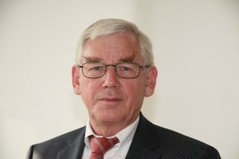- Poul Nielson,
- former Danish government minister and EU commissioner. On the left: Finnish Minister of Labour Jari Lindström
- FACTS about the report ‘Working life in the Nordic region – challenges and proposals’
-

Prepared for the Nordic Council of Ministers by former Danish government minister and EU commissioner Poul Nielson.
Built on more than 100 conversations with ministers, members of parliament, civil servants, researchers, representatives for employers and trade unions across the Nordic region. Nielson has also had meetings at the EU Commission, the European Parliament, with European think tanks, the ILO and the OECD. He has also read the minutes from several years worth of ministerial meetings.
Does not go into the particular conditions of the public sector.
The report is the third of its kind on a Nordic level. The first one was the so-called Stoltenberg report on the potential for defence and security cooperation between Nordic countries (2009), written by the former Norwegian minister of defence and foreign affairs Thorvald Stoltenberg. The Könberg report, which analyses the Nordic health sector (2014), was written by the former Swedish minister of social affairs Bo Könberg.
- The report’s 14 proposals for strengthened Nordic labour market cooperation:
-
-
Fewer border obstacles. Nordic governments to support a joint Nordic examination of solutions to border obstacles for citizens concerned.
-
Political cooperation on migration. A more substantial and active pan-Nordic political effort to face the challenges refugees and migration present to the Nordic labour market model. A special working group under the Council of Ministers should provide ongoing analysis and proposals for initiatives.
-
Better labour market statistics. Nordic governments should set up a steering group to secure quality and compatibility with support and coordination from the Secretariat of the Nordic Council of Ministers.
-
Stronger Nordic cooperation on working environments. The Council of Ministers should decided to upgrade the efforts regarding the psychosocial working environment and investigate the possibilities for harmonising legislation in the area, discuss enhanced Nordic participation in and shaping of the work in the EU’s expert committees in the working environment area. Ministers should exchange experiences on the inspection of the working environment.
-
The gender equality issue should be prioritised in a fully horizontal manner in cooperation on working life.
-
A list of ideas for how to handle the fragmentation both in the Nordic region and internationally.
-
Mandatory adult education and continuing training for all in the Nordic region. Nordic government should commit to this and test two models together with the social partners.
-
The particular challenges for job creation in the western Nordic region should be studied and undergo political debate.
-
More thematic political debates between Nordic labour ministers based on presentations produced in broader cooperation.
-
Strengthened preparation of meetings. The Secretariat of the Nordic Council of Ministers gets a more substantive, initiating and coordinating role in the preparation of ministerial meetings.
-
More money for more ambitious cooperation. Governments must secure financing of a more ambitious Nordic cooperation on the working life area.
-
Joint branding in the EU. Nordic labour ministers should organise a stronger joint branding of the core of the Nordic labour market model – on Commission, Parliament and Council levels.
-
Cooperate with the ILO. The Nordic Council of Ministers for Labour intensifies cooperation with the ILO on improved labour market statistics internationally and knowledge of the Nordic model.
-
The Nordic Council of Ministers for Labour should upgrade the Nordic region’s cooperation with the OECD.
-
-
Related
 Follow us on Facebook
Follow us on Facebook
